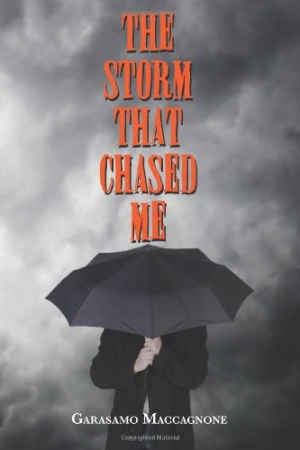The Storm that Chased Me
It is 1989, and twenty-three-year-old Michigander Dante “Doopers” Lanza has had a black cloud following him for as long as he can remember. As a child, he watched his overbearing mother, Genie, drive his sickly father, Tommy, out of the house and out of his son’s life with her vindictive ways. In addition to this, Doopers is sick—sick with colitis, and worry, and love.
Weakened by his disease and unable to live alone, Doopers feels trapped in Genie’s house. Receiving love letters from his virginal, devout Catholic girlfriend, Maricela, is the only bright spot in his life. But the purity of their love is overshadowed by the risks Maricela takes as she shepherds victims of human trafficking from the dangers in Mexico to safety across the US border.
A series of events propels Doopers out of his mother’s house and back into Tommy’s life. Father and son embark on an impromptu road trip. Dogged by tumultuous emotions from the past, they head toward Maricela in her Texas hometown, unaware they are about to collide with a situation that dwarfs their own problems completely. In The Storm that Chased Me, veteran author Garasamo Maccagnone skillfully integrates the joy of young love into the challenges of a life impacted by disease. Along with this, he explores themes of family ties and spirituality to create a compelling novel.
When Doopers learns his father, whom he sees as both physically and psychologically strong, has not let his own colitis stop him, Doopers begins a slow transformation from frail and self-satisfied to solid yet spiritually troubled. As he reviews his past actions and considers his present thoughts, he wonders if he is worthy of Maricela’s unconditional devotion. While Doopers occasionally calls on God, he discovers that Tommy does not believe in God as such, but he believes that humans are called upon to help one another. The author deftly spools out the plot so that the physical journey of the story mirrors the strengthening of the father-son bond. Maccagnone combines the conventions of a road-trip and a “buddy” story with a classic spiritual crisis; the results are fresh and nuanced.
For the most part, the author has created dynamic characters, and some of them change in surprising ways. In contrast, Maricela remains little more than a symbol whose virtue and piety strain credibility. By the time readers meet her in person, not filtered through fragments of love letters or Doopers’s fond flashbacks, they see so little of her that she does not have time to make an impression as a fully fleshed-out character. This does not blunt the novel’s overall power, however.
In any case, themes from The Storm that Chased Me will pursue readers long after they finish the book.
Reviewed by
Jill Allen
Disclosure: This article is not an endorsement, but a review. The publisher of this book provided free copies of the book and paid a small fee to have their book reviewed by a professional reviewer. Foreword Reviews and Clarion Reviews make no guarantee that the publisher will receive a positive review. Foreword Magazine, Inc. is disclosing this in accordance with the Federal Trade Commission’s 16 CFR, Part 255.

